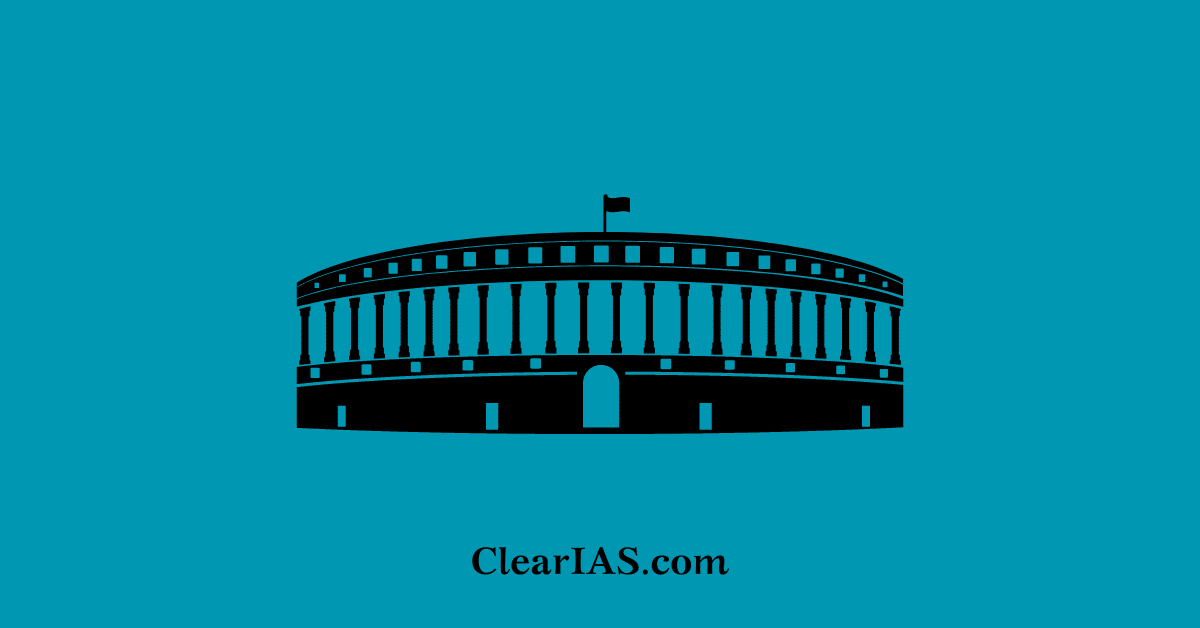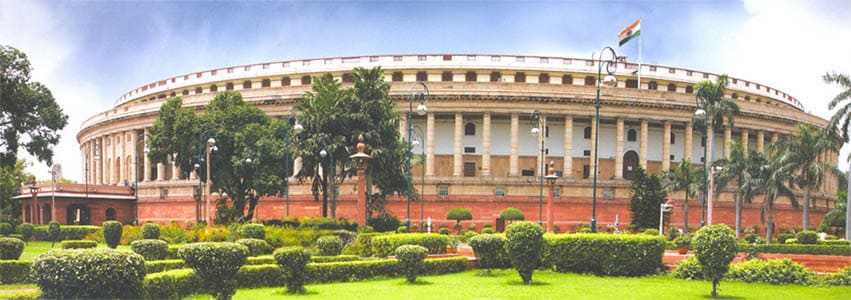 Though Article 79-122 deals with Chapter II (Parliament) of Part V (Union), we shall break the topic into sub-sections. In this post, we are covering only articles 79-88, which deals with the General provisions regarding the Parliament.
Though Article 79-122 deals with Chapter II (Parliament) of Part V (Union), we shall break the topic into sub-sections. In this post, we are covering only articles 79-88, which deals with the General provisions regarding the Parliament.
Parliament consists of the President of India, Lok Sabha and Rajya Sabha. Normally, three Sessions of Parliament are held in a year: (i) Budget Session (February-May); (ii) Monsoon Session (July-August); and (iii) Winter Session (November-December).
Also read: Parliamentary System
Chapter II Parliament
Article 79 : Constitution of Parliament
There shall be a Parliament for the Union which shall consists of the President and two Houses to be known respectively as the Council of States and the House of the People.
Article 80 : Composition of the Council of States –
(1) The Council of States shall consists of –
(a) twelve members to be nominated by the President in accordance with the provisions of clause (3); and
(b) not more than two hundred and thirty-eight representatives of the States and of the Union territories.
(2) The allocation of seats in the Council of States to be filled by representatives of the States and of the Union territories shall be in accordance with the provisions in that behalf contained in the Fourth Schedule.
(3) The members to be nominated by the President under sub-clause (a) and clause (1) shall consists of persons having special knowledge or practical experience in respect of such matters as the following, namely: –
Literature, science, art and social service.
(4) The representatives of each State in the Council of States shall be elected members of the Legislative Assembly of the State in accordance with the system of proportional representation by means of the single transferable vote.
(5) The representatives of the Union territories in the Council of States shall be chosen in such manner as Parliament may by law prescribe.

Article 81 : Composition of the House of the People
(1) Subject to the provisions of article 331, the House of the People shall consists of – (a) not more than five hundred and thirty members chosen by direct election from territorial constituencies in the States, and
(b) not more than twenty members to represent the Union territories, chosen in such manner as Parliament may by law provide.
(2) For the purposes of sub-clause (a) of clause (1), –
(a) there shall be allotted to each State a number of seats in the House of the People in such manner that the ration between that number and the population of the State is, so far as practicable, the same for all States; and
(b) each State shall be divided into territorial constituencies in such manner that the ratio between the population of each constituency and the number of seats allotted to it is, so far as practicable, the same throughout the State:
Provided that the provisions of sub-clause (a) of this clause shall not be applicable for the purpose of allotment of seats in the House of the People to any State so long as the population of that State does not exceed six millions.
(3) In this article, the expression “population” means the population as ascertained at the last preceding census of which the relevant figures have been published:
Provided that the reference in this clause to the last preceding census of which the relevant figures have been published shall, until the relevant figures for the first census taken after the year 2000 have been published, be construed as a reference to the 1971 census.
Article 82 : Readjustment after each census
Upon the completion of each census, the allocation of seats in the House of the People to the States and the division of each state into territorial constituencies shall be readjusted by such authority and in such manner as Parliament may by law determine:
Provided that such readjustment shall not affect representation in the House of the People until the dissolution of the then existing House:
Provided further that such readjustment shall take effect from such date as the President may, by order, specify and until such readjustment takes effect, any election to the House may be held on the basis of the territorial constituencies existing before such readjustment:
Provided also that until the relevant figures for the first census taken after the year 2000 have been published, it shall not be necessary to readjust the allocation of seats in the House of the People to the States and the division of each State into territorial constituencies under this article.
Article 83 : Duration of Houses of Parliament
(1) The Council of States shall not be subject to dissolution, but as nearly as possible one-third of the members thereof shall retire as soon as may be on the expiration of every second year in accordance with the provisions made in that behalf by Parliament by law.
(2) The House of the People, unless sooner dissolved, shall continue for five years from the date appointed for its first meeting and no longer and the expiration of the said period of 5 years shall operate as a dissolution of the House:
Provided that the said period may, while a Proclamation of Emergency is in operation, be extended by Parliament by law for a period not exceeding one year at a time and not extending in any case beyond a period of six months after the Proclamation has ceased to operate.
Article 84 : Qualification for membership of Parliament
A person shall not be qualified to be chosen to fill a seat in Parliament unless he –
(a) is a citizen of India, and makes and subscribes before some person authorised in that behalf by the Election Commission an oath or affirmation according to the form set out for the purpose in the Third Schedule;
(b) is, in the case of a seat in the Council of States, not less than thirty years of age and, in the case of a seat in the House of the People, not less than twenty-five years of age; and
(c) possesses such other qualifications as may be prescribed in that behalf by or under any law made by Parliament.
Article 85 : Sessions of Parliament, prorogation and dissolution
(1) The President shall from time to time summon each House of Parliament to meet at such time and place as he thinks fit, but six months shall not intervene between its lasting sitting in one session and the date appointed for its first sitting in the next session.
(2) The President may from time to time –
(a) prorogue the Houses or either House;
(b) dissolve the House of the People.
Article 86 : Right of President to address and send messages to Houses
(1) The President may address either House of Parliament or both Houses assembled together, and for that purpose require the attendance of members.
(2) The President may send messages to either House of Parliament, whether with respect to a Bill then pending in Parliament or otherwise, and a House to which any message is so sent shall with all convenient despatch consider any matter required by the message to be taken into consideration.
Article 87 : Special address by the President
(1) At the commencement of the first session after each general election to the House of the People and at the commencement of the first session of each year the President shall address both Houses of Parliament assembled together and inform Parliament of the causes of its summons.
(2) Provision shall be made by the rules regulating the procedure of either House for the allotment of time for discussion of the matters referred to in such address.
Article 88 : Rights of Ministers and Attorney-General as respects Houses
Every Minister and the Attorney-General of India shall have the right to speak in, and otherwise to take part in the proceeding of, either House, any joint sitting of the Houses, and any committee of Parliament of which he may be named a member, but shall not by virtue of this article be entitled to vote.
Info- Bits related with Parliament
- The total elective membership is distributed among the States in such a way that the ratio between the number of seats allotted to each State and the population of the State is, so far as practicable, the same for all States.
- The Council of States is designed to maintain the federal character of the country. The number of members from a state depends on the population of the state (e.g. 31 from Uttar Pradesh and one from Nagaland).
- Supreme Court can strike down certain provisions/amendments of Indian Constitution, if it feels that the provisions are unconstitutional or alter the basic structure of the constitution. But striking down does not take away the provisions from the Constitution. To take away the provisions, Parliament has to present a Constitution Amendment bill to repeal the provisions.






in constitution , Rajya sabha member term not mentioned .where do you find it.
6 years and two third of the members will be retierd
Yes, you are correct..Constitution left it upon our Parliament..Hence, People’s Representation Act-1951, passed by Parliament mentions the term of Rajya Sabha members which is 6 years..
Hope it will clear your doubt
Where I can find the rest of the articles I. e., from Art 88-122
Hu CC sh kh de unused ml o TV dri we ex tu ye ek hi
need for clarification article-390
Who presides over the first meeting of the newly constituted Lok Sabha?
Pro term speaker